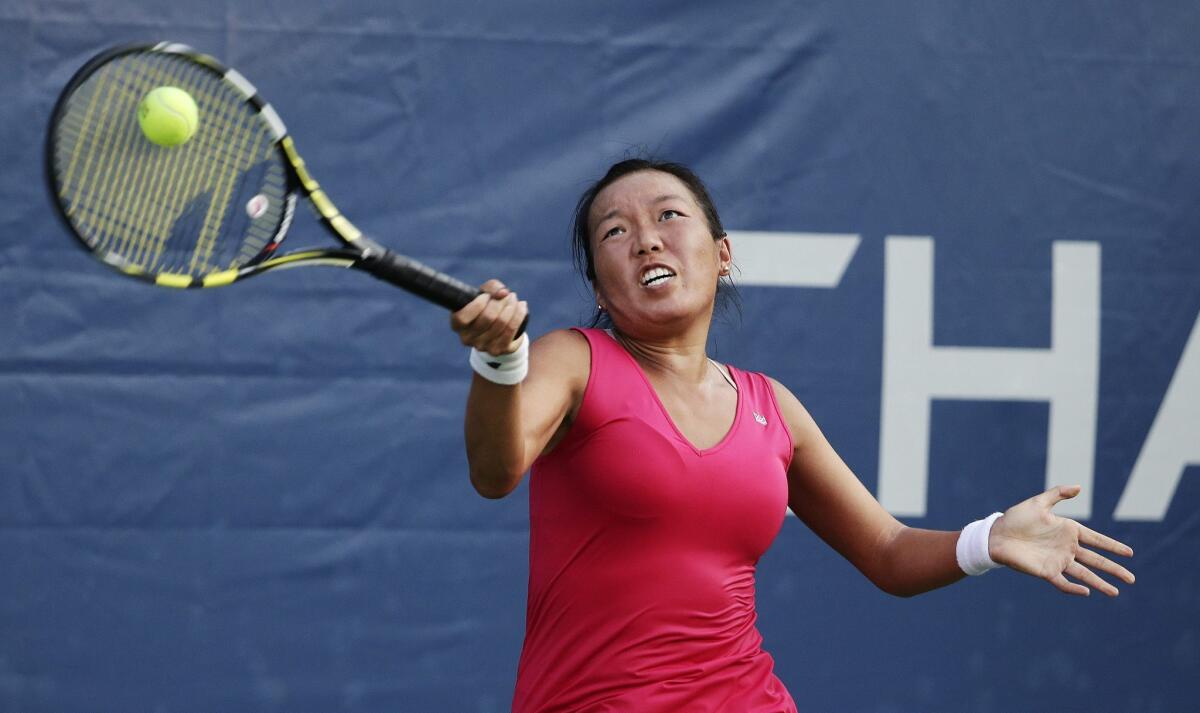Tennis star Vania King brings effort to ace autism home to Long Beach

Vania King hits a return to Roberta Vinci at the U.S. Open on Aug. 31.
- Share via
Vania King, balancing her studies and her professional tennis-playing life, was taking a seminar in autism and she found a way to greatly expand her base of knowledge.
“I thought it would be interesting and beneficial to what I was learning about, in a clinical sense,” King said in a telephone interview.
King became an ambassador for the program ACEing Autism, most recently assisting with the launch in Torrance, which started last year. Now her interests and background have neatly merged in her native Long Beach and former high school, Long Beach Poly.
The 26-year-old was raised on the courts of Long Beach in the truest sense. King, a Wimbledon and U.S. Open doubles champion in 2010, would spend hours and hours on the court with her brother and sisters first learning the game at the direction of her father.
Among her goals now is to provide a low-cost program and a recreational outlet for youngsters with autism in the city where she first learned to play. It starts on Saturday at Long Beach Poly and the first session is free, King said. The general program’s website is: www.aceingautism.com
“The program cost is $10 per session with the high school tennis coach and volunteers from the tennis team,” King said. “My goal is to get as many kids in as possible but that the parents bring them in consistently.
“It’s a six-week program, running every Saturday for two hours. The whole six-week package would be $50. I would like to emphasize, if a family can’t afford it, we are willing to cover it.”
ACEing Autism started in the Boston area in 2008, via the efforts of Richard Spurling and his wife, Shafali Spurling Jeste. The couple moved to Los Angeles in 2009 and Jeste is an assistant professor in Psychiatry and Neurology at UCLA.
Spurling, the founder and CEO, said there are now 30-plus programs so far. His wife, a pediatric neurologist, had been working in a clinic and got to know the parents of autistic children, meeting about 10 new families a week.
“She realized there was a huge need for recreational programs for these kids,” Spurling said in an interview. “They would drive all over the place to find suitable programs to cater to their needs.
“We thought we should look to see if a tennis program would work. Every week we made a little bit of progress.”
The progress of the children and the spirit of volunteerism from the younger members has been gratifying.
“It’s promoted social interaction, picking up balls together, taking turns, a lot of games we do to get them cooperating with each other,” he said. “It’s been amazing to find these young adults that just want to give back and see the program grow.”
More to Read
Go beyond the scoreboard
Get the latest on L.A.'s teams in the daily Sports Report newsletter.
You may occasionally receive promotional content from the Los Angeles Times.











